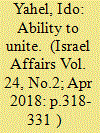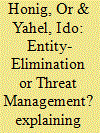| Srl | Item |
| 1 |
ID:
158166


|
|
|
|
|
| Summary/Abstract |
This article compares and contrasts the relations among the three Jewish underground groups in Mandatory Palestine ‒ the Hagana, the Irgun and LEHI ‒ with three anti-colonial national liberation movements: in Malaya, Algeria and Vietnam. It shows that the fact that the Jewish resistance movement had the fewest divisive elements enabled it to unite its three distinct components, however briefly (in 1945–1946), though the reappearance of the divisive factors led to the dismantlement of the united front and to each organisation conducting its own struggle for national liberation.
|
|
|
|
|
|
|
|
|
|
|
|
|
|
|
|
| 2 |
ID:
156935


|
|
|
|
|
| Summary/Abstract |
How do states take over others' sovereign territories? This study explores in depth the techniques of a relatively unnoticed type of takeover—namely, through subversion but without formal annexation. Such takeovers are generally adopted when two conditions occur: seemingly high international costs associated with blunt/overt occupations and the victim state's territory not being ready for full-fledged annexation (for demographic reasons, etc.). To compensate for its lack of direct control over the territory in question, the dominating state must establish unique institutional and political arrangements that will allow it effective domination via remote control. Yet, these remote-control political arrangements are often fragile and get eroded over time, allowing the local populace to eventually rebel. Subversive method is nowadays becoming the preferred tool of choice for states to dominate others mainly due to the changing norms regarding military occupations/annexations.
|
|
|
|
|
|
|
|
|
|
|
|
|
|
|
|
| 3 |
ID:
175704


|
|
|
|
|
| Summary/Abstract |
Israel’s policy towards both terrorist semi-states (TSS)—Fatahland and Hamas-controlled Gaza—shows a puzzling variation over time between threat-management (i.e., deterrence and/or brute force capacity-reduction) and entity-elimination. We hold that a military-based cost-benefit analysis cannot fully account for this variation. This explanation predicts that Israel would avoid the costly and risky TSS-elimination as long as Israel can effectively manage the military danger through the much cheaper deterrence/periodical capacity reduction or when there is a high risk of not getting a much better option partly due to the danger of creating a power-vacuum into which other terrorists may reenter. Yet, some Israeli Prime Ministers pursued TSS-elimination notwithstanding the vacuum consideration and deterrence working. By adding a non-military variable—the extent to which Israel’s policy-makers believe that the TSS harms their ideologically-preferred foreign policy goals—we can better reconstruct changes in threat perception and hence better explain policy variation. The TSSs became an intolerable danger only when non-military threats were involved. Israel was willing to tolerate TSSs when the Prime Minister believed they did not pose a political/ideological threat but sought to eliminate them when he thought they did, if there seemed to be a feasible alternative.
|
|
|
|
|
|
|
|
|
|
|
|
|
|
|
|